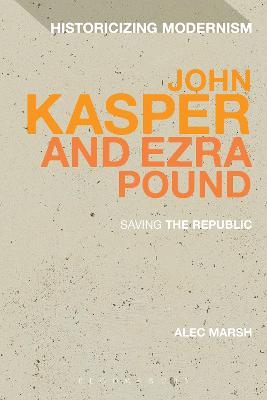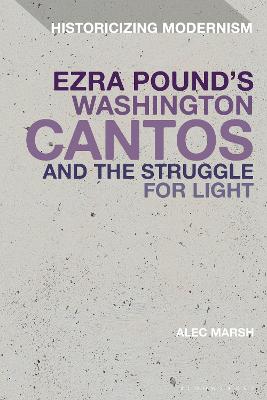Historicizing Modernism
2 total works
John Kasper was a militant far-right activist who first came to prominence with his violent campaigns against desegregation in the Civil Rights era. Ezra Pound was the seminal figure in Anglo-American modernist literature and one of the most important poets of the 20th century. This is the first book to comprehensively explore the extensive correspondence - lasting over a decade and numbering hundreds of letters - between the two men.
John Kasper and Ezra Pound examines the mutual influence the two men exerted on each other in Pound's later life: how John Kasper developed from a devotee of Pound's poetry to an active right-wing agitator; how Pound's own ideas about race and American politics developed in his discussions with Kasper and how this informed his later poetry. Shedding a disturbing new light on Ezra Pound's committed engagement with extreme right-wing politics in Civil Rights-era America, this is an essential read for students of 20th-century literature.
John Kasper and Ezra Pound examines the mutual influence the two men exerted on each other in Pound's later life: how John Kasper developed from a devotee of Pound's poetry to an active right-wing agitator; how Pound's own ideas about race and American politics developed in his discussions with Kasper and how this informed his later poetry. Shedding a disturbing new light on Ezra Pound's committed engagement with extreme right-wing politics in Civil Rights-era America, this is an essential read for students of 20th-century literature.
The instalments of Ezra Pound's life-project, The Cantos, composed during his incarceration in Washington after the Second World War were to have served as a "Paradiso" for his epic. Beautiful and tormented, enigmatic and irascible by turns, they express the poet's struggle to reconcile his striving for justice with his extreme Right politics. In heavily coded language, Pound was writing activist political poetry. Through an in-depth reading of the "Washington Cantos" this book reveals the ways in which Pound integrated into his verse themes and ideas that remain central to American far-right ideology to this day: States' Rights, White-supremacy and racial segregation, the usurpation of the Constitution by the Supreme Court, and history as racial struggle.
Pound's struggle was also personal. These poems also celebrate his passion for his muse and lover, Sheri Martinelli, as he tries to teach her his politics and, in the final poems, mount his legal defence against the unresolved treason charges hanging over his head.
Reading the poetry alongside correspondence and unpublished archival writings, Ezra Pound's Washington Cantos and the Struggle for Light is an important new work on a poet who stands at the heart of 20th-century Modernism. Building on his previous book John Kasper and Ezra Pound: Saving the Republic (Bloomsbury, 2015), Alec Marsh explores the way the political ideas revealed in Pound's correspondence manifested themselves in his later poetry.
Pound's struggle was also personal. These poems also celebrate his passion for his muse and lover, Sheri Martinelli, as he tries to teach her his politics and, in the final poems, mount his legal defence against the unresolved treason charges hanging over his head.
Reading the poetry alongside correspondence and unpublished archival writings, Ezra Pound's Washington Cantos and the Struggle for Light is an important new work on a poet who stands at the heart of 20th-century Modernism. Building on his previous book John Kasper and Ezra Pound: Saving the Republic (Bloomsbury, 2015), Alec Marsh explores the way the political ideas revealed in Pound's correspondence manifested themselves in his later poetry.

